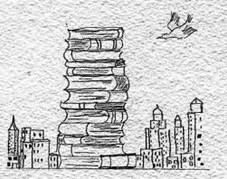两个相爱的人虽然已走进婚姻的殿堂,但各自的藏书却仍天各一方,这怎么看也是完美婚姻的一大缺憾。由此而来,一场藏书之间的“婚礼”势在必行。这场特殊的“婚礼”虽耗时、耗力,但是对两个爱书之人来说,“婚礼”的意义却非比寻常。书之爱、书之趣便在这独特“婚礼”的进行中,在整理藏书的过程中,悄然流露……
 A few months ago, my husband and I decided to mix our books together. We had known each other for ten years, lived together for six, and been married for five. Our mismatched coffee mugs cohabited amicably; we wore each other’s T-shirts and, in a pinch2), socks; and our record collections had long ago miscegenated without incident. But our libraries had remained separate, mine mostly at the north end of our loft, his at the south. We agreed that it made no sense for my Billy Budd3) to languish4) forty feet from his Moby-Dick5), yet neither of us had lifted a finger6) to bring them together.
A few months ago, my husband and I decided to mix our books together. We had known each other for ten years, lived together for six, and been married for five. Our mismatched coffee mugs cohabited amicably; we wore each other’s T-shirts and, in a pinch2), socks; and our record collections had long ago miscegenated without incident. But our libraries had remained separate, mine mostly at the north end of our loft, his at the south. We agreed that it made no sense for my Billy Budd3) to languish4) forty feet from his Moby-Dick5), yet neither of us had lifted a finger6) to bring them together.
几个月前,丈夫和我决定将我们各自的藏书合在一起。算起来我们俩已相识十年,同住六年,结婚五年。我们的咖啡杯虽然看上去并不相配,但却相互依偎、友好共处;我们穿对方的T恤,情急之下,甚至袜子也换着穿;我们各自收藏的唱片老早就混居一处了,而且相安无事。但我们的藏书却仍然保持各自为政:我的书大都摆放在我们这间阁楼的北头,而他的都堆在南头。我们都明白,让我这本梅尔维尔的《比利·巴德》和他那本梅尔维尔的《白鲸》隔着40英尺备受相思之苦却不得团聚,这根本毫无道理可言,但我们俩谁也没有动动手指把两本书搁到一块儿去。
We had been married in this loft, in full view of7) our mutually quarantined8) Melvilles. Promising to love each other for richer or for poorer, in sickness and in health—even promising to forsake all others—had been no problem, but it was a good thing The Book of Common Prayer9) didn’t say anything about marrying our libraries and throwing out the duplicates. That would have been a far more solemn vow, one that would probably have caused the wedding to grind to a mortifying halt10). We were both writers, and we both invested in our books the kind of emotion most people reserve for their old love letters. Sharing a bed and a future was child’s play11) compared to sharing my copy of The Complete Poems of W. B. Yeats or George’s copy of T. S. Eliot’s Selected Poems.
我们当初结婚就是在这个阁楼里,眼睁睁地看着我们各自收藏的梅尔维尔作品天各一方。让我们承诺无论富裕或贫穷、生病或健康都彼此相爱——甚至要我们承诺放弃整片森林,只爱对方一人——这都不是问题,不过好在《公祷书》里没有规定结婚时必须要把两个人的藏书合起来,把重复的书丢掉。那样的誓言对于我们来说可要严肃得多了,而且结果很可能是婚礼气氛压抑,最后不欢而散。我和丈夫都是以写作为生的人,我们对自己的书都有着很深的感情,这种感情有点儿像大多数人心中对他们的旧情书所怀有的那种情愫。同床共枕、分享未来对我们来说不难,相比之下,若是要我把我那本《叶芝诗歌全集》或要乔治把他那本《艾略特诗选》拿出来共享,那就痛苦得多了。
Our reluctance to conjugate our Melvilles was also fueled by some essential differences in our characters. George is a lumper12). I am a splitter13). His books commingled democratically, united under the all-inclusive flag of Literature. Some were vertical, some horizontal, and some actually placed behind others. Mine were balkanized14) by nationality and subject matter. Like most people with a high tolerance for clutter15), George maintains a basic trust in three-dimensional objects. If he wants something, he believes it will present itself, and therefore it usually does. I, on the other hand, believe that books, maps, and scissors are all unreliable vagrants16), likely to take off for parts unknown, unless strictly confined to quarters. My books, therefore, have always been rigidly regimented17).  我们之所以迟迟不愿把各自手里梅尔维尔的书放在一起,还因为我俩在性格上有一些本质的区别。乔治喜欢把东西都堆在一块儿,而我喜欢把东西分门别类地分开放。他的书总是很民主地混作一堆,团结在无所不包的“文学”这面大旗下。有横着摆的、竖着放的,还有被其他书挡住看不见的。而我的书都按国别和主题分类归整。和大多数对杂乱无序无所谓的人一样,乔治对三维的立体事物抱有一种基本的信任。要是他想要某个东西,他相信那东西会自己出现,因此事情也常常如他所愿。而我恰好相反,我相信书、地图、剪刀等都像是靠不住的流浪汉,你要是不严格规定它们摆放的位置,它们就会跑到你不知道的地方去。因此,我的书总是严格按照类别摆放归位。
我们之所以迟迟不愿把各自手里梅尔维尔的书放在一起,还因为我俩在性格上有一些本质的区别。乔治喜欢把东西都堆在一块儿,而我喜欢把东西分门别类地分开放。他的书总是很民主地混作一堆,团结在无所不包的“文学”这面大旗下。有横着摆的、竖着放的,还有被其他书挡住看不见的。而我的书都按国别和主题分类归整。和大多数对杂乱无序无所谓的人一样,乔治对三维的立体事物抱有一种基本的信任。要是他想要某个东西,他相信那东西会自己出现,因此事情也常常如他所愿。而我恰好相反,我相信书、地图、剪刀等都像是靠不住的流浪汉,你要是不严格规定它们摆放的位置,它们就会跑到你不知道的地方去。因此,我的书总是严格按照类别摆放归位。
After five years of marriage, George and I finally resolved that we were ready for the more profound intimacy of library consolidation. It was unclear, however, how we were to find a meeting point between his English-garden approach and my French-garden one. At least in the short run, I prevailed, on the theory that he could find his books if they were arranged like mine but I could never find mine if they were arranged like his. We agreed to sort by topic—History, Psychology, Nature, Travel, and so on. Literature would be subdivided by nationality.
经过五年婚姻生活的磨合,乔治和我终于决定,是时候把我们各自的藏书放到一起,让我们的亲密关系更近一步了。但是,如何在他那种英国花园式的藏书布局和我这种法国花园式的藏书风格之间找到一个结合点,这一点还不明了(编者注:英式花园看上去像自然景观,比较随意,花草蔓生;法国花园较正式,布局严整,花木修剪整齐)。不过至少从短期来看,占上风的是我。我的理论是,如果他的书按我的方法摆放,他可以找到他要的书;但如果我的书按他的方法乱放,我就永远也找不着我要的书了。我俩一致同意按主题来给图书分类,主题包括历史、心理学、自然、旅游等等。文学类的书按作者国籍再进一步细分。
So much for the ground rules. We ran into trouble, however, when I announced my plan to arrange English literature chronologically but American literature alphabetically by author. My defense went like this: Our English collection spanned six centuries, and to shelve it chronologically would allow us to watch the broad sweep18) of literature unfold before our very eyes. The Victorians belonged together; separating them would be like breaking up a family. Our American collection, on the other hand, was mostly twentieth-century, much of it so recent that chronological distinctions would require Talmudic19) hairsplitting20). Ergo21), alphabetization. George eventually caved in22), but more for the sake of marital harmony than because of a true conversion. A particularly bad moment occurred while he was in the process of transferring my Shakespeare collection from one bookcase to another and I called out, “Be sure to keep the plays in chronological order!”
基本原则就这么多。但是,当我宣布我打算把英国文学类书籍按年代摆放,而美国文学类书籍按作者姓氏的字母顺序摆放时,我们遇到了麻烦。我的理由如下:我们收藏的英国文学书籍时间跨度有六个世纪,把它们按照年代顺序摆放在书架上,我们就可以将英国文学的浩然长卷尽收眼底。维多利亚时代的作品就像一个整体,若把它们分开感觉就像拆散一个家庭一样。而我们收藏的美国文学类书籍大部分都是20世纪的作品,其中许多都是非常近期的作品,要是按年代顺序来排列这些书,我们就得像犹太法典那样对之进行细密无比的区分。因此,只能按作者姓氏的字母顺序排列。乔治最后妥协了,但与其说他是对我的理由心悦诚服,倒不如说他是为了我们婚姻的融洽作出让步。而当他正在将我收藏的那些莎士比亚作品从一个书架挪到另一个书架上时,我们又遭遇了一个糟糕至极的时刻,我冲他大叫:“那些剧本一定要按时间顺序来摆!”
“You mean we’re going to be chronological within each author?” he gasped. “But no one even knows for sure when Shakespeare wrote his plays!”
“你是说同一个作者的作品也得按时间顺序摆吗?”他喘着气说,“但压根就没人确切地知道莎士比亚到底是什么时候写的这些剧本啊!”
“Well,” I blustered, “we know he wrote Romeo and Juliet before The Tempest. I’d like to see that reflected on our shelves.”
“谁说的,”我冲他吆喝,“我们就知道他写《罗密欧与朱丽叶》是在写《暴风雨》之前!我希望能在咱们的书架上看到这一点。”
George says that was one of the few times he has seriously contemplated divorce.
乔治后来告诉我,他曾有那么几次很严肃地考虑过和我离婚,而这就是其中之一。
Our transfer of books across the Mason-Dixon Line23) that separated my northern shelves from his southern ones took about a week. Every night we lined up books on the floor, interlarding24) mine with his before putting them on the shelves, which meant that for a week we had to hopscotch25) over hundreds of volumes in order to get from bathroom to kitchen to bedroom. We physically handled—fondled, really—every book we owned. Some had inscriptions26) from old lovers. Some had inscriptions from each other. Some were like time capsules27).
我们花了大约一个星期的时间把家里那条南北分界线两侧(分界线以北是我的书架,以南是他的)的书乾坤大挪移了一番。每天晚上,我们都在地板上把书码成几排,将我的书和他的书混在一起,然后再把它们摆放在书架上。也就是说,整整一个星期,我们要是想从浴室到厨房再到卧室,就必须在好几百卷书之间跳来跳去。我们用手摸弄——实际上是爱抚——我们拥有的每一本书。有的书上写着昔日恋人的寄语;有的书上是我们给对方的留言;还有些书像时代文物密藏器,让我们回忆起那个时代的点点滴滴。
By far the hardest task came toward the end of the week, when we sorted through our duplicates and decided whose to keep. I realized that we had both been hoarding redundant copies of our favorite books “just in case” we ever split up. If George got rid of his beat-up copy of To the Lighthouse28) and I said goodbye to my paperback of Couples29)—well, then we would clearly have to stick together for good. Our bridges would be burned. We each owned copies of about fifty books in common. We decided that hardbacks would prevail over paperbacks unless the paperbacks contained marginalia30).
在那一周快结束时,我们开始对我俩重复的藏书进行整理,并决定要保留谁的那本,这是我们整理藏书以来遇到的最艰难的任务。这时我才意识到,对于我们喜欢的那些书,我们俩都会偷偷地各自收藏一本,“以防”将来分手。这也就是说,如果乔治放弃他那本已经翻烂了的《到灯塔去》,或是我扔掉我那本平装本的《夫妻们》——唉,那我们无疑就得永远拴在一起了。我们就都没有退路了。我俩重复的书大概有五十本。我们决定有硬皮精装本的就不留平装本的,但平装本上有批注的则另当别论。
After a final, post-midnight push, we were done. Our duplicates, plus another hundred or so painful culls31), were neatly stacked, ready to be carted off to Goodwill32). Sweating and panting beneath our triumphantly united Melvilles, we kissed.
经过最后的努力,我们终于在后半夜完成了这项大工程。我们重复的藏书,另外还有百来本经过痛苦抉择挑出来不要的书,整齐地堆成一堆,准备用车送到国际亲善行业的连锁店去。看着头顶上终于放到一起的梅尔维尔的书,满头大汗、气喘吁吁的我们忍不住拥抱亲吻。
Our library was in impeccable order, but it was a little airless, much as my own life had been before George entered it. And so, by subtle degrees, as the weeks passed, George’s style began to retake the upper hand in a not entirely unwelcome fashion.
我们的书房现在井然有序、无可挑剔,不过就是显得有点沉闷乏味,很像乔治走进我的生命之前我的生活状态。就这样,潜移默化地,几个星期后,乔治的风格又重新占了上风,不过这次的方式倒不是完全不受欢迎。
A couple of weeks ago when George was out of town, I decided to reread Travels with Charley33). I got into bed with the copy I had first read the summer I turned seventeen. I was settling into the familiar feel of my crumbly old paperback, the one with Steinbeck sitting cross-legged next to his poodle on the cover, when I reached page 192. There, next to a passage about the dwindling redwood forests of California, in a younger version of my husband’s handwriting—I’d recognise it anywhere—was the plaintive comment: “Why do we destroy the environment?” We must have had identical copies, and we’d kept George’s. My books and his books had become our books. We were really married.
几个星期前乔治去外地时,我决定把《查理与我》拿出来重读一遍。我拿着书钻进被窝,书正是我17岁那年夏天第一次读到的那本。在书的封面上,作者斯坦贝克盘腿而坐,旁边是他的髦毛狮子狗。我渐渐沉浸在这本已然陈旧不堪的平装书带给我的那种熟悉的感觉中,这时我读到了第192页。就在那一页,在叙述加利福尼亚的红杉树林越来越少的那段文字旁边,我发现了一句悲痛的旁注:“我们为什么要破坏环境?”正是我丈夫年轻时候的字迹——他的笔迹在哪儿我都能认出来。我们肯定是曾经拥有过两本一模一样版本的书,而留下的是乔治这本。我的书和他的书已经融为一体,成了我们的书。现在的我们才真正是一对夫妻了。
1. Anne Fadiman:安妮·法迪曼,1953年生于美国纽约市,美国作家,曾任《文明》杂志编辑和《美国学者》主编。
2. in a pinch:在紧要关头,必要时
3. Billy Budd:《比利·巴德》,19世纪美国小说家赫尔曼·梅尔维尔(Herman Melville, 1819~1891)的作品。
4. languish [5lAN^wIF] vi. 受苦,受折磨
5. Moby-Dick:《白鲸》,赫尔曼·梅尔维尔于1851年发表的一部海洋题材的小说
6. lift a finger:尽举手之劳;出一丁点儿力气
7. in full view of:把……尽收眼底
8. quarantine [5kwCrEnti:n] vt. 使孤立,隔离
9. The Book of Common Prayer:《公祷书》,圣公会的祈祷用书,是圣公会信仰的一个重要特征,也是保存圣公会信仰的重要途径。
10. grind to a halt:(渐渐地)停下,停止
11. child’s play:易事
12. lumper [5lQmpE] n. 把东西堆在一起的人
13. splitter [5splItE] n. 作不必要的过细区分者
14. balkanize [5bC:lkEnaIz] vt. (使)分成若干小单位
15. clutter [5klQtE] n. 混乱
16. vagrant [5veI^rEnt] n. 游民,流浪者
17. regiment [5redVImEnt] vt. 把……编组
18. sweep [swi:p] n. 范围;视野;(一)系列
19. Talmudic [tAl5mQdIk] adj. [宗] 犹太教法典的,《塔木德经》的。Talmud [5tAlmud] n. [宗]《塔木德经》,关于犹太人生活、宗教、道德的口传律法集。
20. hairsplitting [5heE7splItIN] n.〈贬〉无谓的过细区分;钻牛角尖
21. ergo [5E:^Eu] adv. 因此,由是
22. cave in:投降,屈服
23. Mason-Dixon Line:美国南北分界线(美国马里兰州与宾夕法尼亚州之间的分界线,为过去蓄奴州的最北边界线)
24. interlard [7IntE5lB:d] vt. 使混杂,混入
25. hopscotch [5hRpskRtF] vi. 跳跃着行进;到处走动
26. inscription [In5skrIpFEn] n. 题字
27. time capsule:时代文物密藏器,一种内部存有代表当前文化的物品、文献等的器物,密封埋藏,供后世了解现代情况之用。
28. To the Lighthouse:《到灯塔去》,英国作家弗吉尼亚·沃尔夫(Virginia Woolf, 1882~1941)的作品
29. Couples:《夫妻们》,美国作家约翰·厄普代克(John Updike, 1932~2009)的作品
30. marginalia [7mB:dVI5neIljE] n. 旁注
31. cull [kQl] n. 剔除之物,拣剩之物
32. Goodwill:全称为Goodwill Industries International,国际善意行业,美国最大的两家慈善旧货商之一,创建于1902年,为非营利性组织。
33. Travels with Charley:《查理与我》,美国作家约翰·斯坦贝克(John Steinbeck, 1902~1968)的作品
